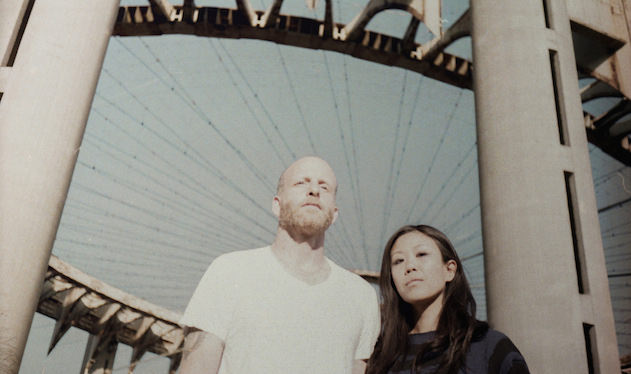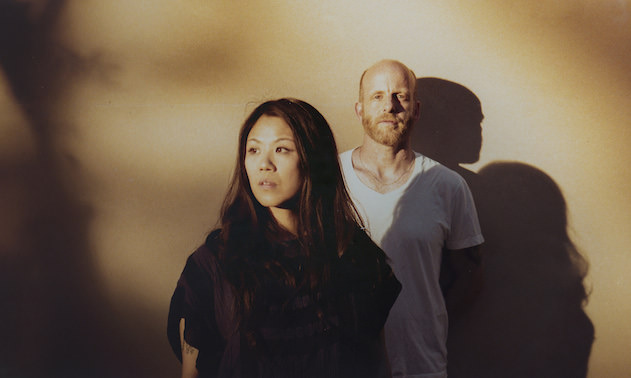
There’s a parallel looking back to what you called your “first music career”: you’ve said that people were really angrily opposed to the synths in Six Finger Satellite’s music. Did that feel as though you were swimming against the tide of what people thought a band signed to Sub Pop should to be? Did you enjoy challenging people in that way?
We very much fed off of the energy of antagonising people in the audience in front of us and the larger world in general. We had a very gang-like mentality, a very us-vs-them chip on our collective shoulder. J Ryan, 6FS’s lead singer, would often come on stage with a moustache, red leather jacket with fringe and matching chaps, a Moog Liberation strapped on. In the indie rock world of the early to mid 90s, that was so far afield from anything that was being done. A lot of the time we were just trying to make ourselves laugh, but we truly did not give a fuck, and that was a very liberating time. To Sub Pop’s credit, they were always behind us 100%, fully supporting us financially and psychically.
Growing up as a hardcore kid in Boston you were a part of what was an incredibly vibrant and also quite diverse scene at the time – from, say, Gang Green to SSD to Slapshot. What’s your own take on the importance of scenes in general? Does it matter to you whether you’re part of a community of sorts?
Insular scenes are very important in the history of popular music over the last 50 years or so. Places like Detroit, Seattle, the Lower East Side noise/no wave scene, Columbus, Austin – these are places where these loosely defined collectives developed with a seeming disregard for what was happening outside their areas. But that’s primarily with rock music. These days collectives revolve around labels, largely for commercial viability reasons. Crosstown Rebels is a good example – they’ve pretty much grown their own music scene around the label with their parties, with their lord of dark forces Damian Lazarus at the helm. It’s a way for labels to thrive in an era when no one is actually paying for their music.
For myself, being part of DFA is important. It’s a big part of my life in general. It’s a centering thing, an area of focus. It’s both connected to an area, NYC, and a group of people. I need to participate in the community of it regularly in order to stay on course. This can just mean getting a dinner together in the Brooklyn, seeing who’s home and touching base. Then we all get together and talk about the same shit we’ve been talking about for years – what new synths we’ve bought, compressor ratio settings, some new coffee place in Tokyo that someone discovered…
How do you compare your experience as an observer of that kind of close-knit regional scene with you experience now – from the other side of the fence – as an artist in a much more international scene? Are there similarities or have the internet and the globalisation of music changed things? Do you think scenes today – however you may define them – have as much of an impact on the way people create and enjoy music?
Being part of DFA is important. It’s a big part of my life in general. I need to participate in the community of it regularly in order to stay on course.
The international scene confuses me most of the time. Sometimes I’ll get caught up in thinking too much about what I can or can’t play in certain cities, like ‘I’m going to London, surely I can’t play tracks by Big London DJ X…’, and then I’ll get there and play one of those tracks to pretty much zero recognition in the audience. The internet gives you a very distorted view of what’s ‘big’. In some ways having the DFA label is helpful, because people know what to expect. In other ways it’s a limitation, because every once in a while I’ll get billed with ‘indie dance’ type DJs – one of my most hated sub-genres, by the way – and the audience will be totally lost or upset because I’m playing long deep loopy tracks with scary sounds.
But other than that, I have no idea what the impact of regional scenes is. You become friends with other DJs over time, and to me it seems like most traveling DJs are pretty isolated in a way. You spend a lot of time on the road going from place to place by yourself, and then you go home and try to get things done in your studio, alone. And then I’ll pop on the internet and get confused by the mass promotional campaigns of people trying to ‘make it’, and get very sad.
There are two ways to become successful in this world, in my opinion. The first is to organically develop yourself by playing locally as much as you possibly can while working on music that reflects your scene and what you’re trying to convey. This can take years, but you will potentially become an amazing DJ because you’ll be playing a lot, making your mistakes at home, eventually figuring everything out. The second way is to make a track that blows up. I see this happen regularly – someone makes a track that all of a sudden every DJ in the world is playing, and then they get huge offers to play all over the world. And often they just are terrible. Maybe they’ve never even DJed before. In some ways it’s an unfair expectation.
To what extent do you separate the writing, demoing, recording, production and mixing phases of your creative process? To so many electronic musicians all of those phases coalesce into one loosely defined ‘production’ process. Given that you tend to demo tracks at home, record the parts in the DFA studio and then mix entirely on hardware – without all the benefits of instant recall and so on – each of those parts of the process must be quite distinct. Is that something that you think helps to define the output in a creative sense, or is it just a necessary approach given the tools you’re working with?
I think it’s simply a function of making electronic oriented music. With a band you’re all working out a song together, you go out and play it live, then record it in a studio. With electronic music, the people making it are often not musicians or even songwriters. I’m not a real songwriter. I make songs that start with sounds and grooves, and try to turn those things into songs with verses and choruses. It’s why I need to work with other people as well. On my own, I’m not very interesting. But when I have other people to create with, the world seems to open up and it becomes much more dynamic and exciting. My forte is in seeing something in another musician who has something that will complement what I’m doing.
I really enjoy the way your tracks are mixed. Aesthetically, when you mix your tracks, what kind of sound are you looking to achieve?
I come from a very classic engineering background. My goal, without consciously thinking about it very much, is mostly attaining a very balanced mix. However, this can be very dangerous. Much of the time, left to my own devices, I’ll do very nice mixes that are well balanced and very boring. I constantly try to remind myself to make one element too loud, or to strive for sonic differences. My sound is now often described as ‘retro’, which I think is simply an ignorance of music history. We’re so inundated with music that is made with no ‘real’ instruments – sounds generated entirely in the computer – that when you hear a recording with instrumentation that has been captured via a microphone it now resonates as retro.
I’m not a real songwriter. I make songs that start with sounds and grooves, and try to turn those things into songs with verses and choruses.
That’s not to say I’m against digital or electronic sounds. Kraftwerk, for example, used an entirely electronic sound palette and yet their sound is very warm and organic sounding, to use two worn out and now cliched recording descriptors. But Kraftwerk were using actual instruments that existed in the real world, running through more electronics before being recorded to magnetic tape. It’s an overall effect that’s very pleasing to the ear on both a conscious and subliminal level. People will continue to listen to Kraftwerk for many more years. Without knowing anything about the technology, the layperson hears it as pleasing. In contrast, disregarding any argument about artistic merit, no one listens to a Lady Gaga album for very long. It literally hurts your ears and brain. Maybe the songs are great, but the way they sound is so bombastic and artificial, it takes work to actually listen to it for an extended period of time.
If we take ‘Happy House’ as a pretty obvious example, that’s an incredible mix. There’s so much movement and life in it. How much of that would you say is down to the mixdown process itself and how much is just to do with live instrumentation and human elements during the recording process?
‘Happy House’ is a weird sounding record. It actually has very little bass – I bet there’s not much information below 80 Hz. It doesn’t fit with contemporary recordings in the middle of a DJ set. It’s mixed more like a rock record. But aside from that, I think all the live instrumentation has much to do with its feel and how it sounds. Most everything in that song was played by hand: real drums, real bass guitar. The piano riff is a looped couple of bars played by Alex Frankel.

07.31 AM
An inspiring & enlightening interview with depth, very good read thank you both!
09.09 AM
Juan doesn’t bullshit around.
good questions = honest and inspiring answers ! Thanks. Steve
08.55 PM
Juan is a very smart man, indeed. It’s comforting to hear that someone established in the business has the same doubts many of us have when making tracks. And yes, Juan’s music has been an inspiring and positive influence in my life. I’ve met a few people in the DFA crew, and they are such nice, cool, and creative people. That label and the people in it deserve all the respect and success in the world.
04.04 PM
Really great, wonderfully revealing stuff on page 4, reminds of wtf with maron. Great Great Great!